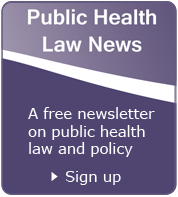Breastfeeding
Winnable Battles Resources
Research shows breastfeeding can help reduce childhood obesity and protect babies from several medical issues. Benefits are particularly noticeable when mothers exclusively breastfeed for the baby’s first 6 months and continue breastfeeding up to 2 years of age with appropriate, complementary foods. Mothers can legally breastfeed in public in every state, and federal law permits working mothers a reasonable time to express breast milk in a private setting at the workplace.
Federal Law
- Patient Protection and Affordable Care Act (ACA) (PL111-148) Section 4207
Enacted in March 2010, PPACA contains Section 4207, requiring employers to provide reasonable break time for nursing mothers. The United States Breastfeeding Committee posted Frequently Asked Questions about Section 4207 on its website.
State Law
No laws in the United States (U.S.) forbid breastfeeding outside of the home, and only two states (Illinois and Missouri) place any limitation on public breastfeeding. State laws protect public breastfeeding by expressly stating a woman has a right to breastfeed in public or by specifying that the act of breastfeeding is not indecent exposure.
- National Conference of State Legislatures (NCSL)
The NCSL provides a summary of state breastfeeding laws. As of March 2010, 44 states, the District of Columbia, and the U.S. Virgin Islands have health laws with language specifically allowing women to breastfeed in any public or private location. Twenty-eight states, the District of Columbia, and the U.S. Virgin Islands exempt breastfeeding from public indecency laws. Twenty-four states, the District of Columbia, and Puerto Rico have laws relating to breastfeeding in the workplace. Twelve states and Puerto Rico exempt breastfeeding mothers from jury duty and five states and Puerto Rico have implemented or encourage the development of a breastfeeding awareness education campaign. - La Leche League
The La Leche League provides a series of written articles related to the law and breastfeeding.
Case Law Related to Breastfeeding in the Workplace
- Protection under Title VII of the Civil Rights Act of 1964 and the Pregnancy Discrimination Act (PDA)
Title VII, the federal law that prohibits most workplace harassment and discrimination, covers all private employers, state and local governments, and educational institutions with 15 or more employees. In addition to prohibiting discrimination against workers because of race, color, national origin, religion, and sex, protections have been extended to include barring against discrimination on the basis of pregnancy, sex stereotyping, and sexual harassment of employees. Plaintiffs argued that breastfeeding should be considered a “related medical condition” to pregnancy and that Title VII prohibits breastfeeding discrimination because excluding it from coverage is contrary to the stated Congressional intent behind the PDA amendment. Courts have typically concluded that breastfeeding is a choice made by the mother and not protected under Title VII.
Disclaimer: Information available on this website that was not developed by the Centers for Disease Control and Prevention (CDC) does not necessarily represent any CDC policy, position, or endorsement of that information or of its sources. The information contained on this website is not legal advice; if you have questions about a specific law or its application you should consult your legal counsel.
- Page last reviewed: August 21, 2015
- Page last updated: August 21, 2015
- Content source:




 ShareCompartir
ShareCompartir



